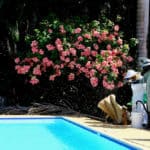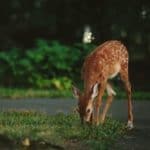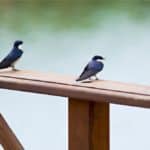There are a few smells that will keep birds away from your garden. Generally speaking, birds don’t have very strong lungs, meaning they are easily irritated by overwhelming or strong smells and less likely to land in these areas.
Spraying these liberally in your garden will keep them away, usually without causing them any harm.

Garlic, cayenne pepper, chili, and essential oils are smells that keep birds away. Leaving these smells in your garden (as crushed powders) can help deter birds and stop them from entering your garden.
You can also mix them with essential oils of your choice and water to create a spray that can be applied.
You should apply the spray or powder in areas you have seen or suspect the birds are using. When they try to land next, the smell will put them off, and they will fly away, leaving your garden free!
You can also use professional products or bird repellents too. These will have a chemical-like smell usually that irritates birds and will keep them away from your garden.
Take care with these, though, as some can be toxic and harmful to birds! It’s best to opt for a natural smell or repellent to avoid causing any injuries to birds.
You can check with a vet or online if you are worried about any bird repellent being harmful to birds. If you have other pets, check that none of the ingredients will be toxic to them too.
Do birds hate peppermint?

Yes, birds hate peppermint! Their lungs aren’t very strong, meaning they can be irritated by strong scents such as peppermint. If you are looking to deter birds in your garden, peppermint or peppermint oil, in particular, is an excellent way to do this!
Peppermint oil tends to smell stronger and will be easier for you to use in your garden, ensuring that the birds stay away! Peppermint is also an excellent and natural way to deter other insects and rodents that could be wreaking havoc in your garden.
You will need to take care when using peppermint, though, as it can be toxic to some birds. It can be extremely toxic to parrots, increasing their chances of diseases and impacting their immune system. If you have any pet birds, then take care to ensure they don’t come into contact with peppermint.
The smell should work as just deterring birds away from your garden, meaning you won’t need to worry too much about the landing and ingesting any. If they do, though, be sure to take the birds to a vet immediately.
You can mix the peppermint oil with some water to create a spray that can be used in your garden. Spray it where the birds are usually seen and reapply when the smell starts to fade to ensure it stays effective.
Do birds hate the smell of cinnamon?

As birds don’t like strong or overwhelming smells, birds will not like the smell of cinnamon! You can use cinnamon mixed with other strong spices and smells to prevent birds from entering your garden or home.
Popular smells to mix cinnamon with are chili powder, black pepper, and cayenne pepper. Mix these with some water and spray in your garden, or hang in little balls if you wish. Coating these balls in aluminum foil also helps, as birds don’t often like shiny materials.
Be sure to replace the cinnamon or reapply the smell after rain, or it fades. You want the smell to be strong enough to prevent the birds from landing, so anytime it starts to fade, get your spray bottle out again!
There is some conflicting advice, though. While cinnamon is less likely to harm birds than chemical-based substances, it seems there’s mixed information as to whether they like the smell or not! Some people recommend using cinnamon sticks around your home to scent it without irritating or causing harm to pet birds, rather than air fresheners or other substances.
Overwhelmingly, it would seem so, as it is frequently used in mixtures to keep them away, but perhaps on its own, it isn’t always as effective. We think it's still worth a try, especially a mixture we mentioned earlier. Don’t be afraid to try other mixtures, though, if cinnamon isn’t the most successful for you!
Do mothballs deter birds?

Yes, you can use mothballs to deter birds! Using mothballs is a fantastic way to keep birds out of your garden using household items. They also deter vultures too so they can be great for those having any issues in their garden.
To use mothballs to deter birds, place them in bowls in areas where birds are a problem. The chemicals in mothballs will irritate the birds (as they do not like overwhelming smells) and fly away instead of landing in your garden and causing grief.
Should the mothballs get damaged by the rain or other elements, you can dispose of them as you usually would and replace them. Once the smells start to fade or they look visibly worn is a good time to replace them with new mothballs.
You will need to take care when using mothballs to deter birds, though, as they can be toxic. The chemicals and their fumes can be incredibly toxic and harmful when ingested by birds. If you notice any birds suffering or struggling, you will need to take them to a vet immediately for treatment.
Take care if you have any dogs, too, as mothballs can be toxic to them! Ensure that your pet cannot reach or access the mothballs if they are placed in the garden. Again, you will need to seek help immediately if you notice any change in their behavior or if they have ingested the mothballs.
For those with pets, it is probably safer to consider another option to deter birds that keep your other animals safe from harm!
Will vinegar deter birds?

Yes, vinegar is another natural deterrent that you can use to keep birds away! You can use the vinegar on its own or create a mixture using vinegar that can be sprayed around your garden to stop birds from entering or nesting there.
The strong smell of vinegar is likely to irritate a bird's lungs and stop them from landing in your garden. You will need to ensure that the smell is strong and stays strong to keep birds away.
A good way to do this is to mix apple cider vinegar with water and crushed cayenne pepper. You can pour this into a spray bottle and spray it on the areas you suspect the birds are using. You can also spray it near your plants to keep them safe from birds too.
It's better to use apple cider vinegar due to its smell, and it will work to keep other rodents away too! When using vinegar, though, do take care, as the acetic acid in vinegar can be irritating and harmful to animals and humans. Dilute the vinegar with water and other spices to reduce this, and take care of other animals in your garden.
Typically, apple cider vinegar isn’t as dangerous. If you are concerned about the impact it will have on your other pets, be sure to contact a vet for more information.









